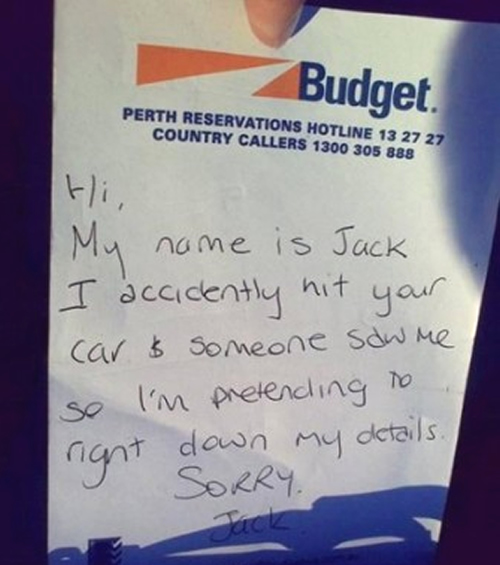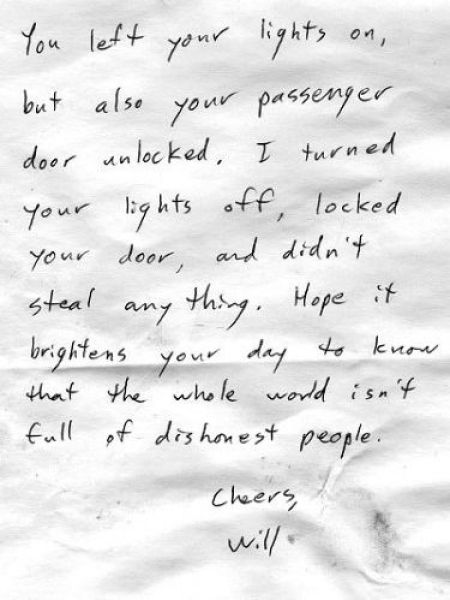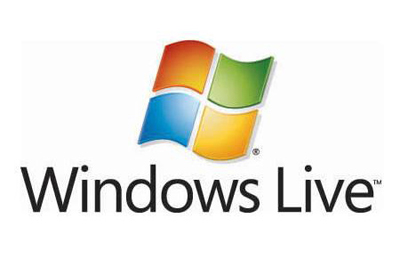Written by Adam Tod Brown
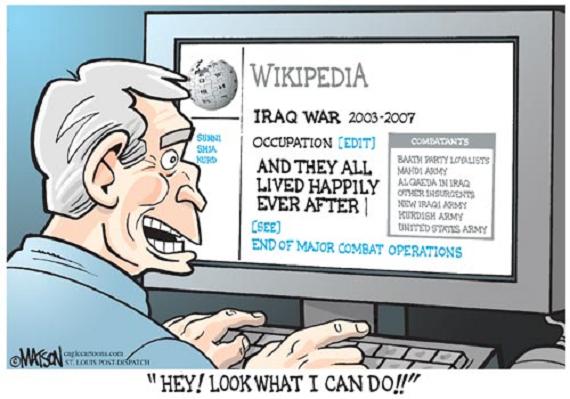
Over the years, Wikipedia has actually morphed into a somewhat useful source of information. Sure, anyone can edit it, but the people who do usually go to great lengths to make sure the information provided is as accurate and neutral as possible.
But every once in awhile, some random maniac swoops in and tries to bring all of that thoughtful discussion and hard work crashing down in a big heaping wreck of crazy. You would think that when it happens, people would just dismiss it as the ravings of an internet lunatic. But you would be wrong.
Why Does Everyone In The Matrix Wear Black Clothes and Sunglasses?

It should come as no surprise that the Wikipedia entry for The Matrix is a hotbed for heated discussions. Nerds do love to bicker. The discussions on the Matrix page veer wildly between valid (no, The Matrix isn’t a retelling of the story of Jesus) and shit nobody in their right mind should ever care about (why does “There is no spoon” redirect here?).
That’s to be expected. Those aren’t the kind of discussions that are ever going to finally free you from the shackles of virginity, but as they relate to the movie, why not bring it up? But in March of 2007, a Wikipedia user named Ratso dropped this bomb on the discussion.
“Why do all the characters wear black clothes and sunglasses? That seems to be the stereotype but there doesn’t seem to be much of an explanation why.”
Rather than shut this down with a swift and logical “because that shit looks awesome” the editorial community jumped into action, offering up various theories and fiercely debating whether actually unlocking this treasure chest of wisdom would benefit the research community. (Hint – it would not.)
The Debate Begins
“Please do not use Wikipedia as a forum for subjects other than improving the article.”
If we could sign our John Hancock somewhere to show our wholehearted support for this position, we damn sure would. Actually, we probably can, but it would undoubtedly be deemed Wikipedia vandalism or something, like that time we edited our own Wikipedia page to suggest that the entire editorial and writing staff have gigantic cocks. Even the chicks. Sometimes the internet just can’t handle the truth.

Assistant fashion editor Rico O’Shaugnessy and his gigantic cock
At any rate, in a perfect world, the discussion would have ended here.
The Debate Continues
“Actually, if we could find out the answer to Ratso’s question, it could be added into the article – thus improving the article. Sometimes discussion helps, you know.”
If ever there is an award given for the internet community with the most free time on its hands, Wikipedia will win it hands down. While those among us who aren’t physically chained to our keyboards would blow a question like this off without a second thought, apparently, someone is going to try and tackle it. What will they find?
The Debate Gets Ridiculous
“All the characters wear sunnies and black leather trenchcoats because while in the Matrix they appear as they want to appear/see themselves ideally; alot cooler/suaver than in the real world. It just so happens that these revolutionaries Neo, Trinity, Morpheus could really identify with the psycho kids from Colombine.”
Yeah? They could relate to the Columbine shooters? Could they also see into the future? Because the Columbine shootings happened in April of 1999. The Matrix, on the other hand, was released in March of 1999.
The Verdict
Edit not allowed. As of today, the world is still in the dark as to why the characters in the Matrix wear black. Someday, some brave Wikipedia editor may come along with the information we need. And we shall call him…The One.
How Many Pictures of Oprah Winfrey Are Too Many?

There is something to be said for stubbornness. Where would we be as a society if Rosa Parks just went ahead and gave up her seat or if that guy in Tiananmen Square just moved out of the way of those tanks? Similarly, where would we be if Wikipedia user Cardriver didn’t leave everything on the floor during the fierce battle to defend her right to upload seven pictures of Oprah Winfrey to Wikipedia?

Probably a bad analogy
The shit hit the fan on July 4th, 2006 when the Oprah Winfrey page’s nomination for Good Article status failed. We have no idea what that means. But we do know the reason it failed was because there were too many images included on the page. Eight pictures, to be exact. The user who uploaded those pictures, Cardriver, did not take this news well.
“I couldn’t disagree more. Any good encyclopedia should include as many relevant photographs as possible because photos communicate information far more efficiently than language can. Haven’t you heard the expression “a picture’s worth a thousand words?”
Really? Photos communicate information far more efficiently than language can? Then riddle us this, after seeing this picture, would you feel comfortable hopping into a van with this man, or would you need a little more information first, perhaps of the spoken kind?

The Debate Begins
“Actually, any good encyclopedia should strive to describe a topic in brilliant prose rather than relying on copyright violations. A picture may be worth a thousand words, but that doesn’t give us the right to use pictures that don’t belong to us.”
You would think this would have ended things. Basically, the photos in question are copyrighted and therefore can’t be used no matter how relevant they may be. No matter. Cardriver is just getting warmed up.
The Debate Continues
“Comparing the edits made by you to those of Vexel and Zorklift, it’s a little obvious you’re just another sock puppet (duplicate account) of Cardriver. Please stop wasting everyone’s (and your own) time.”
At this point, Cardriver has fought her way through copyright infringement claims and is now being outed as having set up duplicate accounts to make it appear as if there were people arguing on her behalf. She can’t possibly top that, can she?
The Debate Gets Ridiculous
Yes, she can. First, how about suggesting that those who would conspire to keep photos of Oprah off of Wikipedia are engaging in age discrimination?
“A bunch of us are very elderly so we’re new to this whole wikipedia thing. I really feel as though we’re being picked on by more experienced users of the technological age. I would really hate to think that any administrators of such a wonderful place as wikipedia would be abusing their power. When I first arrived at Wikipedia I loved it and found everyone welcoming, but once I incorrectly uploaded some beautiful Oprah photos people have been not at all helpful. I’ve really never felt so bullied in my life. Please show some compassion.”
If that doesn’t work, there’s always the time tested racism argument.
“Why is it okay for a white male like Bill Clinton to have 18 photos but a black female like Oprah is having trouble getting only 8?”

Fight the Power, Cardriver!
The Verdict
Shockingly, all of that campaigning eventually paid off. A compromise was reached and four of the eight contentious images were included in the article. Let this be a lesson, never give up on your dreams, kids.
What Does “Gay Icon” Mean Again?
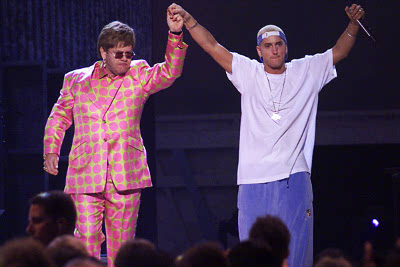
Obviously, Wikipedia vandalism is nothing new. You leave an entire repository of information open to be edited by the public and inevitably someone is going to use it to imply that the lead singer of Nickelback enjoys dong.
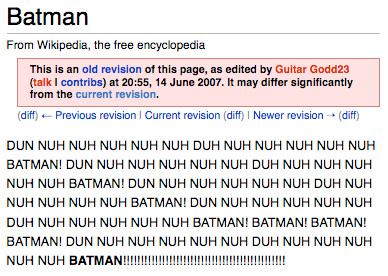
Or do this
But when this happens, it’s mandatory that the Wikipedia community pauses for a second before haphazardly tossing the vandalism label around. Because it could just be that the person editing the page is a dumbass.
Take what happened when an anonymous user tried to edit Eminem’s Wikipedia page to add him to the “gay icon” category. That seems like some pretty blatant vandalism, but when you listen to the explanation behind it, you quickly realize that it’s not vandalism at all. It’s just that this guy has no idea what “gay icon” means.
The Debate Begins
“The “gay icon” category isn’t exclusive to public figures who ARE gay. It’s for anyone who has had any kind of notoriety with gay audiences.”
Wow, by those standards, the guy who runs the Westboro Baptist Church is a gay icon.

The Debate Continues
“So gays don’t like him and that makes him a gay icon? Look up icon first.”
The Debate Gets Ridiculous
“Would it be too much trouble to ask you to get an account so we know what to call you?”
Really? You really want to go down this path, Wikipedia? In situations like this, it’s best to just call them stupid and move on.
The Verdict
Do we really need to tell you? Edit not allowed.
Argument about Whether the Gremlins Are Racist Seems Kind of Racist

When discussing matters of race, it’s important that you not somehow come off as a racist yourself. You know, unless you’re discussing how you totally believe that your race is superior to another, in which case, by all means, get your bigot on. But otherwise, you have to tread carefully.
Take the case of Wikipedia user Deeceevoice, for example. In September of 2006 they took to the discussion page for the movie Gremlins to question why the information they added about the Gremlins being racist was removed. Keep in mind, they weren’t referring to the Asian shopkeeper who initially sold Gizmo. That was the most racist shit ever and everyone knows it. But instead, this was Deeceevoice’s beef…
The Debate Begins
“The creatures exhibit some of the worst sterotypical behavior attributed to blacks. They are wild, drunken, carousing, violent, murderous, seductive, lascivious, crude and rowdy. The females are depicted with big, red lips.”

Like this?
Yep, that sounds just like the kind of vitriol our racist uncle Smiley used to spout at family gatherings back in the day. “Stay away from black people, they’re seductive!” Roger that, crazy uncle Smiley.
After another user wisely points out that this is a retarded argument, Deeceevoice digs in even deeper by pointing out that the Gremlins were also breakdancing and acted “cool” so, obviously, they were intended to be black. Duh!
The Debate Continues
“You can claim that small green rubber toys with inhuman features represent an attack on black people if you want, just because they wear sunglasses and breakdance, but in order to do this you’d have to believe that no one else wears sunglasses or breakdances.”
The Debate Gets Ridiculous
After someone makes an almost equally ridiculous claim that the bar scene in question was meant to highlight the “corrupt elite,” you know, as opposed to just showing a bunch of fucking Gremlins acting up, Deeceevoice comes back with this…
“The “corrupt elite” would not be in what amounted to a sleazy jukejoint atmosphere with gangsta types and low lifes. Next time (if there is a next time) you happen to see the film check it out. Then ask yourself, “If the creators of the scene wanted to depict some redneck hick gremlins, would they have done the drinking and carousing scenes in the same way, with the same music, the same clothes, the same physical characterstics — or, would they have done it differfently?”
There is but one obvious answer to this question. That answer, of course, is “shut the fuck up.”
The Verdict
Edit allowed! Turns out, one person did actually make a claim that the Gremlins were racist in a book called Ceramic Uncles & Celluloid Mammies. Well, shit, they must be racist then! For the record, if anyone is currently in the Wikipedia editing business, we’ve always kind of thought Maxim magazine was pretty racist. Feel free to cite this article if you need to back up that claim.
Michael Jackson: The King of…Ghana?

During his long, illustrious career, Michael Jackson accomplished a lot of things. Grammy Awards, American Music Awards, Billboard Awards, Lifetime Achievement Awards, Honorary King of Ghana.
Wait, what? Is that last one real? If Wikipedia user Street Walker is to be believed, not only is it real, but, like, everybody knows about it. Well, color us ignorant, Street Walker! Please, do explain!
The Debate Begins
“Michael Jackson is the honorary King of Ghana and member of the Bafokeng Ka Bakwena tribe in Phokeng. This is common knowledge, but because wiki requires sources for all its info (except for anything that makes Michael Jackson look bad, that doesn’t need citing apparently) I did a Google search and found this page that contains the info.”
In case you didn’t bother clicking on the link that leads to the source of the eye opening information, let’s just say it’s not the kind of authoritative source you would turn to when putting together your college thesis.
In fact, we showed that website to a Geocities website and the Geocities site said “hey, asshole, 1997 called and said they want their HTML back!” Oh Geocities, lame jokes like that are the reason you got shut down.
The Debate Continues
After the information was removed, Street Walker ups the absurdity levels to new heights with this head scratching argument.
“If you go to Elizabeth II of the United Kingdom you’ll see that after her naem and DOB is says “Queen regnant of the United Kingdom of Great Britain and Northern Ireland” and the long list of countries she rules. So why should Michael Jackson be any different? It’s part of his official title, Michael Joseph Jackson honorary King of Ghana.”
We have absolutely no words for this argument. None. But another Wikipedia user summed it up better than we ever could have.
“Err, Elizabeth isn’t the honorary Queen of England, she is the Queen of England.”
The Debate Gets Ridiculous
After finally giving up on the King of Ghana angle, Street Walker talks a hard left down Insanity Avenue by instead asking that the nickname “Wacko Jacko” be removed from the Wikipedia page entirely.
“Wacko Jacko is a derogatory term used to insult Michael Jackson. It is just as insulting as the ‘n’ word is to black people.”
Also insulting – implying that Wacko Jacko is as insulting as the ‘n’ word.
The Verdict
King of Ghana is out, Wacko Jacko stays. And the world is again as it should be.
Is Adopting a Black Sheep on Farmville Stereotyping?

In the annals of backwards thinking, this argument could go down as the most heinous example of all time. First, get it from the horse’s mouth, Wikipedia user Psilocyberite:
The Debate Begins
“In farmville, one can only adopt a “black sheep”, which is lost and lonely, as opposed to purchase it from the market. While the idiom “black sheep” has lost some of its negative connotation in modern usage, the idea of adopting it and giving it a shelter could qualify as an example of stereotyping, and a discussion could be initiated about the same.”
In case you’re too busy tending to your head which is quite likely spinning uncontrollably from the inherent stupidity you’ve just read to really comprehend what is happening here, basically, someone is suggesting that because you can only adopt a black sheep on Farmville and not outright buy it, that is somehow stereotyping. Makes sense, provided this is some kind of backhanded endorsement of slavery or something. Honestly, coming from Facebook, nothing would surprise us.
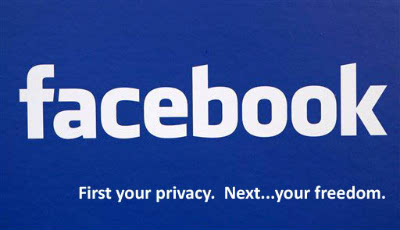
The Debate Continues
“Sterotyping? That is totally idiotic. If someone thinks the term “black sheep” is racial sterotyping, then they are just entirely too sensitive and probably need to get out of the house more often.”
The Debate Gets Ridiculous
Before we get to the responses that actually pertain to this argument, can anyone tell us what the hell this is supposed to mean?
“Why lost&lonely animals are rated so? Me and my friends are founding often ducklings, black sheeps and brown cows are both rare.”
Right, we didn’t think so. At any rate, proving that no point is too absurd for the Wikipedia crowd to debate, there was this…
“Stereotyping” is not automatically “racial sterotyping”. Spare us this hyper-PC nonsense, and stick to actual pro- and contra-arguments, e.g. that there is no obvious reason why an article on FarmVille should deal with either stereotyping or black sheeps.”
We’d like to point out that all spellings of the word “stereotyping” in italics are the work of their respective authors.
The Verdict
Further proving that Facebook is a full on haven of evil and corruption, to this day, no mention of the abhorrent treatment of black sheep on Farmville can be found on the Wikipedia page. No justice, no peace, Facebook. We shall overcome.



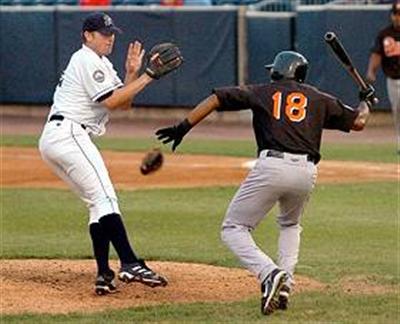







 Starting a new business can be a turbulent undertaking. For one thing, there are no guarantees of success. Businesses fail every single day, and plenty of entrepreneurs come away with nothing to show for months or years of hard-fought effort. The idea of sacrificing a steady salary for an uncertain, hoped-for payday also tends to provoke anxiety.
Starting a new business can be a turbulent undertaking. For one thing, there are no guarantees of success. Businesses fail every single day, and plenty of entrepreneurs come away with nothing to show for months or years of hard-fought effort. The idea of sacrificing a steady salary for an uncertain, hoped-for payday also tends to provoke anxiety.

















